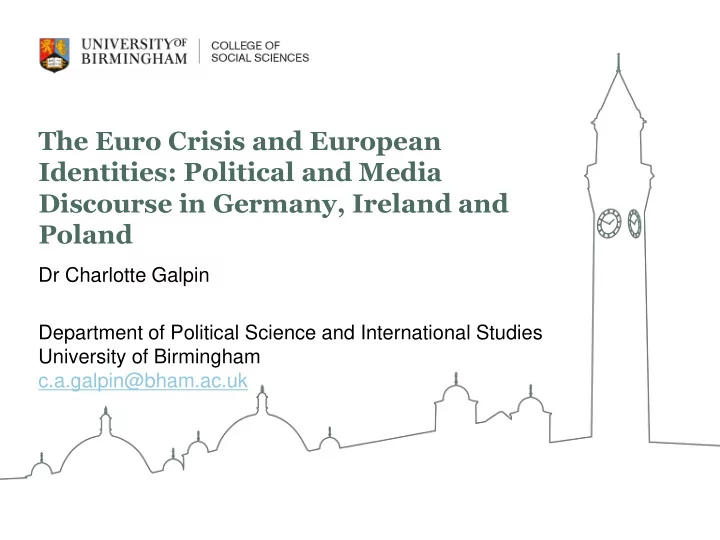

The Euro Crisis and European Identities: Political and Media Discourse in Germany, Ireland and Poland Dr Charlotte Galpin Department of Political Science and International Studies University of Birmingham c.a.galpin@bham.ac.uk
Argument of the Book The Euro crisis has had a minimal effect on European identity discourses Political and media actors act strategically to make sense of the crisis in their respective national contexts European identities become central to legitimising and contesting bailouts and further economic integration
European Identity Discourses • European identity socially constructed through discourse in the public sphere • Different understandings of European identity - “Europeanised national identities” (Risse, 2010) These identity discourses reveal meanings, narratives, the • content of European identity, of what ’Europe and ‘being European’ is • Therefore: European identities which are continually redefined as people communicate about the EU
Crisis and Identity Identities can change at so- called ‘critical junctures’, creating a so- called a window of opportunity‘ for actors change meanings (Risse, 2010) But – what happens at these critical junctures is little understood. Problem is = conceptualised as external events. We therefore need to understand how crisis is talked about and understood.
Crisis and Identity Crises are socially constructed (Hay, 1996, Widmaier, 2007) Political and media actors construct crises strategically in order to make sense of events, to legitimise and contest policy and polity This involves drawing on long-standing discourses on European identity, as actors seek to define who they are, what the community stands for
Methods • Political and media discourse – 3 most widely read newspapers in each country (2 broadsheets, 1 tabloid) – Political speeches and press releases • First Greek bailout (May 2010) and Fiscal Compact (December 2011) • Frame analysis, interpretive discourse analysis
Methods – Case Studies Germany, Ireland and Poland
The German Case Two strands of elite discourse on the EU – post-war European identity and ordoliberal values (Bulmer and Paterson, 2013). European and German identity as intertwined - commitment to set of ‘European’ values Bringing German ordoliberalism to Europe, e.g. ‘European community of stability’ since 1980s Normalisation debate: has Germany developed a stronger sense of national identity (Hyde-Price and Jeffrey, 2001)?
Findings - Germany Construction of an existential threat to European idea References to “founding fathers’ of the EU and Germany’s historical responsibilities, importance of Franco-German relationship in solving the crisis – re- constructs Nazi past as ‘Other’ Strategy to justify Greek bailout in German context, perceived to contravene the ‘no - bailout clause’ in the Maastricht Treaty
Findings – Germany German ordoliberal values linked to concept of the ‘good European’ - fiscal discipline linked explicitly to post-war period and commitment of e.g. Adenauer, Kohl, to European integration. European solidarity = conditional , where Germany provides financial help on the basis of countries implementing structural reforms / austerity measures Often translates into an exclusive Northern European identity where Greece and ‘southern Europe’ are considered the ‘bad Europeans’.
The Polish case Poland - 2 competing discourses on Europe post-1989 Return to Europe – returning to perceived cultural • home in Western Europe, ‚inferiority complex ‘ through location at Europe‘s periphery – intertwined European and Polish identities. Poland as ‚bulwark‘ of Europe, Russia as constituitive Other. Polish sovereignty – Poland as the victim of foreign • powers – related to both the communist era and experience of partitions . Russia/Germany as Others.
Findings - Poland • Highly polarised discourse on the EU On the one hand, particularly by 2011, the crisis • reflects the „return to Europe“ discourse • Possibility of multi-speed EU poses a risk of political marginalisation for Poland in Europe • Pro-European elite express federal visions of European integration with Poland at its core Justified on basis of Europeanised Polish identity • Poland as ‘ bulwark ’ – defender of Western Europe • and common European good (e.g. Sikorski, 2011)
Findings - Poland • On the other hand, crisis debates reinforce Polish sovereignty discourse and exclusive Polish identity – loss of economic sovereignty and independence of Polish state • Sense of victimhood through occupation by foreign powers – anti-German and anti-Russian sentiment It is Polish elites who have ‘capitulated’ to foreign • powers, ‘betrayed’ Solidarity movement and brought independence to an end
Relevance beyond Euro crisis European identity discourses are ‘sticky’ and strongly informed by historical memory They shape how European crises are understood and are used strategically by political and media actors to legitimise or contest policy responses BUT the resilience of European identity does not mean that the crisis did not have an impact, rather, by reinforcing often competing conceptions of Europe it possibly strengthened Europe’s divisions
Thank you! c.a.galpin@bham.ac.uk
Recommend
More recommend